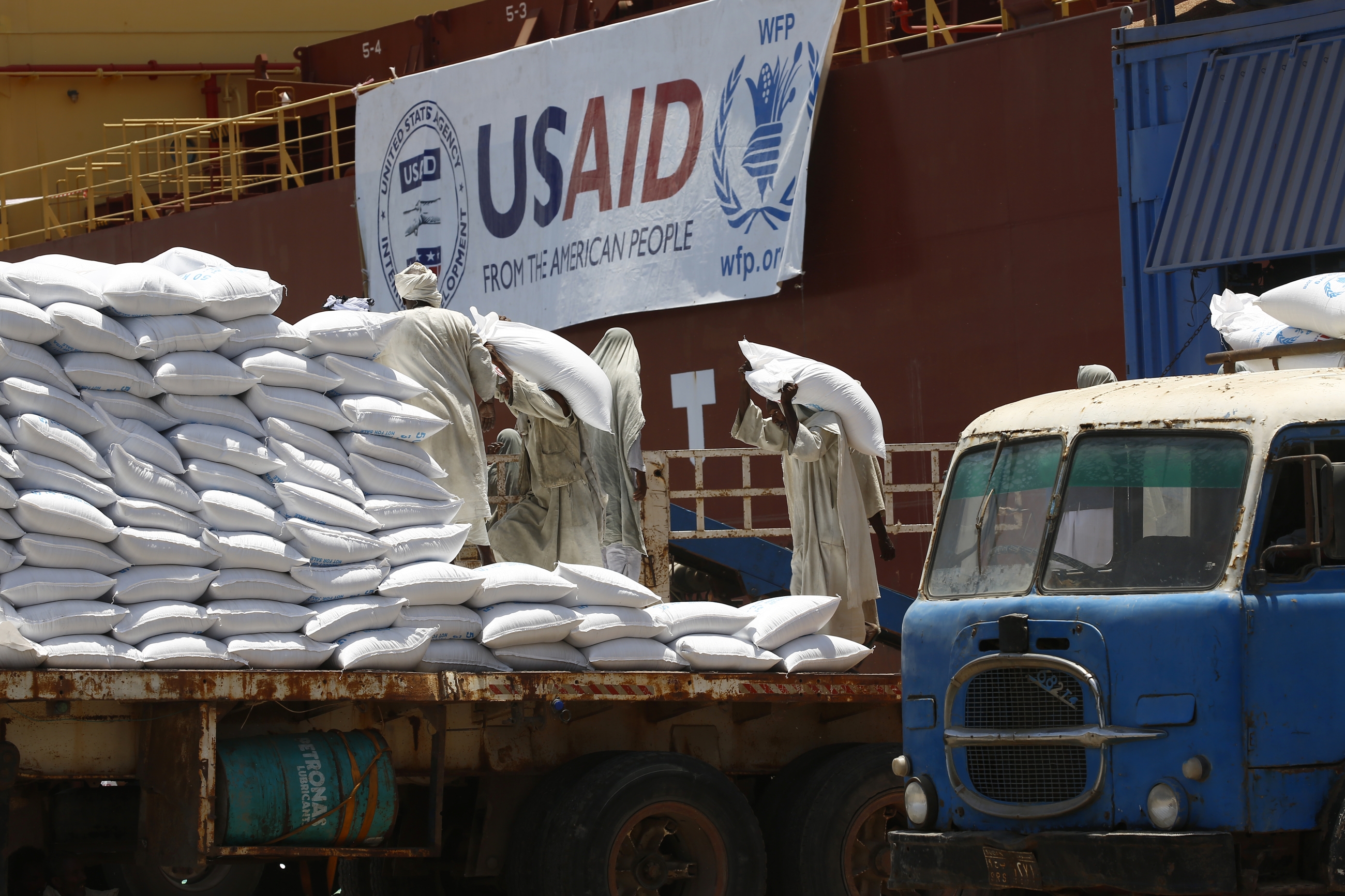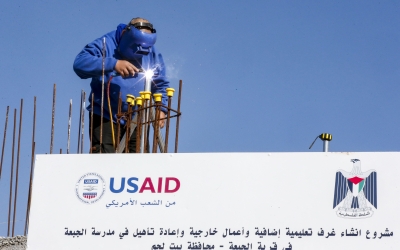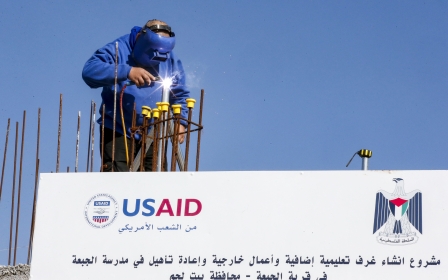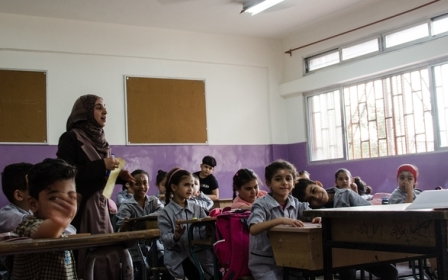Confusion and mistrust: How US government shutdowns harm aid to Middle East

As the United States narrowly averted another government shutdown on Thursday, groups reliant on US funds have expressed worry about the long-term consequences that these work stoppages in Washington have on foreign aid.
While the most recent and longest-ever shutdown in US history, which lasted for 35 days in December and January, did not alter critical missions such as food aid, medicine delivery, or interests deemed crucial to US national security, it stopped some daily operations and eroded trust with the countries that work with the US, experts said.
"I think it makes us look like jokers," Dr Daniel Honig, a professor of international development at Johns Hopkins School of Advanced International Studies (SAIS), told Middle East Eye.
"I think shutdowns hurt our relationships with developing country governments. We're asking people for things and we're not able to live up to our side of the bargain where we've made commitments," he said.
'Organisations that have USAID resources will now be much more careful to have reserves that will help them avoid layoffs in the future'
- Brian Atwood, former head of USAID
Armed with a budget of $1.3bn, the US Agency for International Development (USAID) - the US government’s foreign aid body - gives grants and awards contracts to private organisations and NGOs.
New MEE newsletter: Jerusalem Dispatch
Sign up to get the latest insights and analysis on Israel-Palestine, alongside Turkey Unpacked and other MEE newsletters
It also provides oversight, technical support and assistance to its missions across the Middle East and other regions.
During the recent shutdown, USAID furloughed half its 3,100-person staff and halted new contracts and requests for more money from aid groups.
"Many new contracts are not being issued, projects are falling off their timelines, new project development is delayed," Honig said.
When shutdowns happen, oversight regarding contractors also becomes more limited, he said.
USAID did not respond to MEE's email request for comment prior to publication.
Though the shutdown's full impact on the chain of US foreign aid remains unclear, organisations dependent on USAID money said it disrupted their day-to-day operations.
Bill O'Keefe, vice-president of government relations for Catholic Relief Services, a large aid organisation that uses USAID funding, said the latest government shutdown created funding delays and confusion among programme staff in various countries.
It "has also created an overall sense of uncertainty for our partners", he told Middle East Eye in an emailed statement.
"Such delays and confusion can ultimately hurt our local relationships, which can then impact the overall design, implementation, and effectiveness of our programmes," O'Keefe said.
'General disruption'
One USAID employee, who spoke on condition of anonymity, told MEE the shutdown disrupted relatively small operations, hampering the overall effectiveness of the agency.
"Does anything break because we didn't have a youth engagement training, for example? No, probably not," the person said.
"But the whole point of those trainings is that they do squeeze more effectiveness out of our work. So if they're cancelled and can't be easily made up, then it would follow that the work is slightly less effective compared to how it could've been."
The shutdown also led to fears about "severe cash flow problems", according to professor Brian Atwood, a senior fellow at Brown University who led USAID during President Bill Clinton's administration in the 1990s.
"Organisations that have USAID resources will now be much more careful to have reserves that will help them avoid layoffs in the future," Atwood told MEE.
Private groups reliant on USAID money also echoed that sentiment.
"Many, if not most, developing country CBOs [community-based organisations] and NGOs don't have the working capital or the experience to work at risk in this way and to do so could put them in a very vulnerable position," Patrick Fine, CEO of aid group FHI360, recently told Devex, a news outlet that reports on development and aid.
Atwood, who led USAID during the government's second-longest shutdown in 1995-96, said: "Those were trying times.
"The heart of our missions, the foreign service national employees, had to be furloughed along with most of the American staff, so oversight suffered," he said.
Hyper-political assistance
Adding to the damage the shutdown did to the delivery of US aid money, President Donald Trump's administration has hyper-politicised humanitarian assistance, experts told MEE.
“Jared Kushner is particularly interested in Palestine, but Mike Pence is extraordinarily focused on Christians in Iraq," said Dr Sarah Parkinson, a Middle East studies professor at Johns Hopkins-SAIS, referring to Trump’s son-in-law and the vice president, respectively.
At Pence's direction, USAID strongly redirected its funds to go towards helping Christian communities affected by the Islamic State (IS) group in Iraq's Nineveh Plains, the Washington Post reported in June.
Pence has "closely monitored USAID's efforts since October" 2017, the newspaper said.
At the time, the vice president "told the group In Defense of Christians that the administration will bypass 'ineffective' programs run by the United Nations and redirect aid to religious minorities in Iraq through USAID and faith-based organizations", the Post said.
'Jared Kushner is particularly interested in Palestine but Mike Pence is extraordinarily focused on Christians in Iraq'
- Sarah Parkinson, Johns Hopkins-SAIS
Palestine has been another area where the Trump administration's politicisation of humanitarian assistance is most evident.
In August, Trump decided to end all US funding to UNRWA, the UN agency that helps Palestinian refugees.
UNRWA provides assistance to roughly five million Palestinian refugees and previously benefited from hundreds of millions of dollars in US assistance.
The funding cuts led to the loss of 125 UNRWA staffers and even prompted a Gaza aid worker to attempt to self-immolate. In an MEE column, the worker wrote that the US cuts have "thrown my family and I onto the street. The street will not be able to sustain us".
Parkinson also recounted a recent incident in which a man visiting an UNRWA-funded clinic attacked a doctor with a two-by-four after he was told the clinic could not cover his medical expenses in full.
"So the doctor now has a broken hand but they can't hire someone to replace him because they don't have money in the budget. It's absurd. The guy who is frustrated can't go beat up the US government," Parkinson said.
Washington's staunchly pro-Israel stance has also translated into ending all USAID transfers to the occupied West Bank and the Gaza Strip.
According to an MEE report on 1 February, the US government halted hundreds of millions of dollars in aid to the occupied Palestinian territories and Palestinian aid groups in an attempt to pressure Palestinian leaders to negotiate with Israel on the Trump administration's peace plan.
The cuts forced programmes to shutter and NGOs to lay off their employees and led to scrapped infrastructure projects.
Parkinson said these kinds of tactics often fail to work as intended.
"People aren't stupid. They’re not going to be like, 'hey we need to negotiate with the US government', they fundamentally don't trust it given its past actions," she told MEE.
In the case of Iraq, Parkinson said aid to security-oriented programmes often take precedence over other important forms of assistance, such as psychological care for minors or aid that broadly supports populations in Iraqi Kurdistan, where more than a million displaced Iraqis and almost a quarter-million Syrian refugees are living.
"It's extraordinarily hard to find good psychiatrists and good psychologists in that region who speak Arabic or the right dialect of Arabic, but it's not really a sexy political thing to say we're giving therapy to children who lived under ISIS," she said.
"What US donors and particularly the Evangelical coalitions want is to say, 'We’re saving Christian populations that have been targeted for genocide,' which they certainly were, but the scope of people affected by Islamic State's violence is also much broader," she added.
"The way the aid has already been applied has created winners and losers in a way that humanitarian aid is technically not supposed to," she said.
Ultimately, when it comes to a government shutdown, problems arise when state agencies are forced to spend their "use it or lose it" budgets quickly.
Honig, the other SAIS professor, said that's when the quality of those spending programmes suffers.
He likened it to a US television show called Supermarket Sweep, in which contestants ran down the aisles of a grocery store, filling their baskets in under two minutes.
“At the end of that show, what was in the shopping cart was not the optimal bundle of goods that people would have chosen if they had less time pressure," Honig said.
"When we ask people to speed through their budgets, we get lower-quality spending. That's true at the supermarket - that's true at the federal government, too."
Middle East Eye delivers independent and unrivalled coverage and analysis of the Middle East, North Africa and beyond. To learn more about republishing this content and the associated fees, please fill out this form. More about MEE can be found here.





